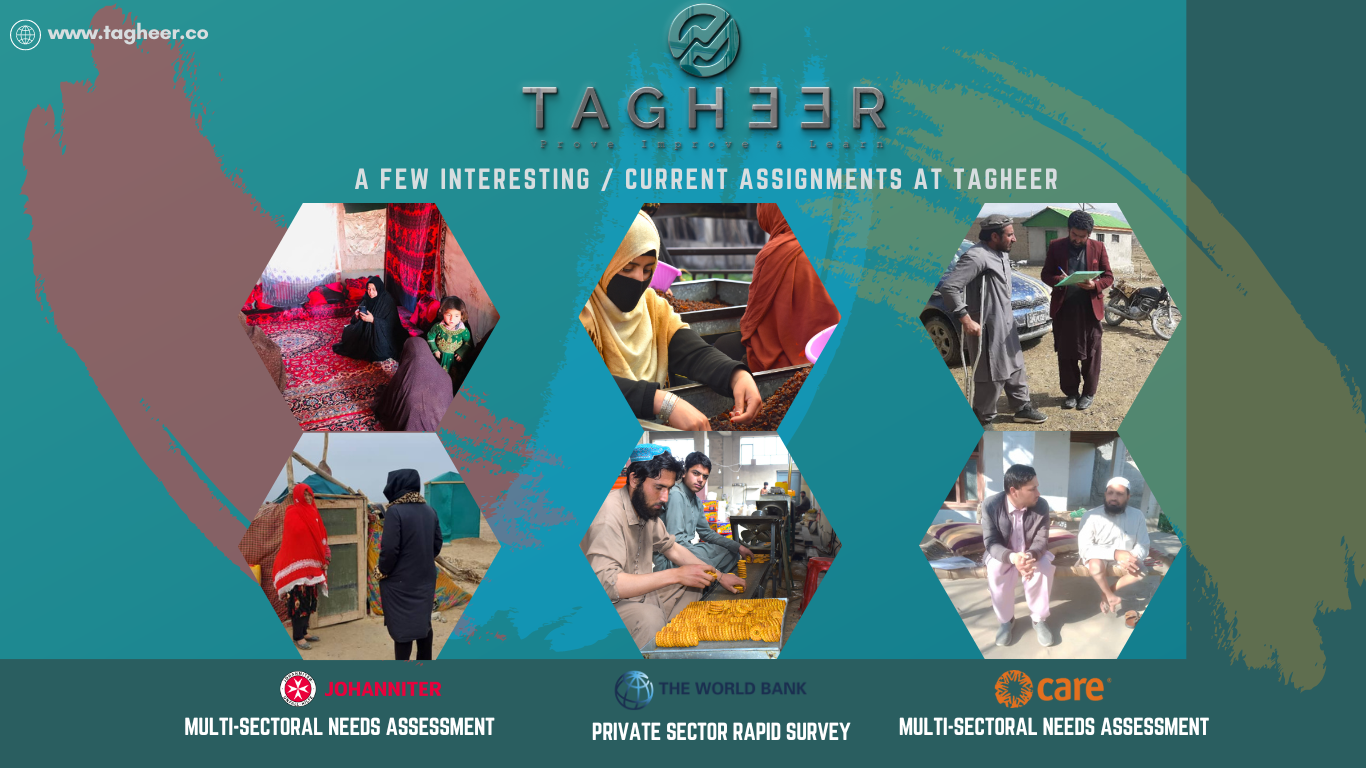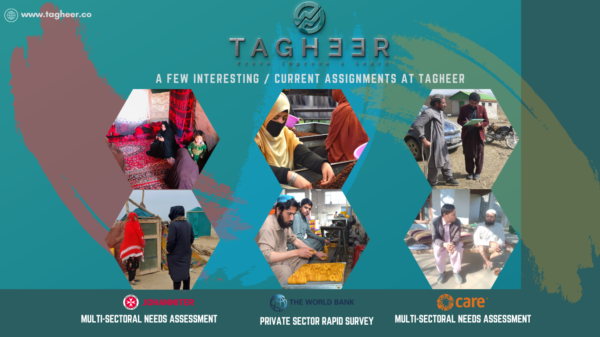| Impacts of displacement on rural livelihoods and social-ecological changes – a study being conducted by TAGHEER in partnership with CMI (Chr. Michelsen Institute), Bergen, Norway. The project intends to review the interlinkages between displacement, refugee and IDP settlements, and environmental changes in Kabul Afghanistan, using focus group discussion (FGD) and key-informant interviews. TAGHEER through tools co-design, data collection, and initial analysis will help CMI i) examine the historical context of human migration/displacement, settlement proliferation, livelihood transition, environmental change and, food security and human well-being; ii) understand changes in water resources in light of environmental as well as socio-economic and institutional changes; iii) understand aid and assistance programs, their impacts on communities and socio-political cultural and institutional factors affecting their operation and impacts; and iv) identify and map phases of adaptation and critical junctures linked to socio-ecological changes, ecological shocks, and disasters. |
| Private Sector Rapid Survey (PSRS) is the 3rd round of assessment being conducted by TAGHEER for the World Bank (WB) to monitor the situation and operational status of the private sector amid the political crisis unleashed after August 2021. The first two rounds of the assessment were led by the WB team themselves. The aim of this round is to institutionalize the assessment exercise and to maintain updated information on the continually evolving situation of the private sector in Afghanistan and challenges to inform the design of any potential future supportive engagements during this challenging time. The continuous insecurity and limited mobility due to the regime change and deep-rooted conservative socio-cultural norms hindering women’s full and active participation in the labor force and business market will also be explored during this round. 422 surveys with small, medium, and large men and women-owned businesses operating in agribusiness, manufacturing, services, construction, retail, and trade sectors within five economic zones (Kabul, Balkh, Nangarhar, Kandahar, and Herat) have been completed. The surveys will be followed by key informant interviews with business regulators, private sector associations, and chambers to validate the survey findings and provide insight into the nature of problems, and opportunities, and to suggest solutions /recommendations. The analysis will compare this round with earlier rounds and will offer practical recommendations for tackling private sector challenges in the short and medium terms. |
| Impacts of displacement on rural livelihoods and social-ecological changes – a study being conducted by TAGHEER in partnership with CMI (Chr. Michelsen Institute), Bergen, Norway. The project intends to review the interlinkages between displacement, refugee and IDP settlements, and environmental changes in Kabul Afghanistan, using focus group discussion (FGD) and key-informant interviews. TAGHEER through tools co-design, data collection, and initial analysis will help CMI i) examine the historical context of human migration/displacement, settlement proliferation, livelihood transition, environmental change and, food security and human well-being; ii) understand changes in water resources in light of environmental as well as socio-economic and institutional changes; iii) understand aid and assistance programs, their impacts on communities and socio-political cultural and institutional factors affecting their operation and impacts; and iv) identify and map phases of adaptation and critical junctures linked to socio-ecological changes, ecological shocks and disasters. |
| Multi-sectoral needs assessment (MSNA) was conducted for CARE in nine (9) provinces of Afghanistan. The MSNA focused on 21 districts within the selected provinces to help inform interventions and lifesaving responses in sectors of Education, health, nutrition, livelihood, Water, Sanitation and Hygiene (WASH) and some integrated Gender-Based Violence (GBV) and nutrition interventions. The assessment followed mixed methods for data collection/analysis using two-staged sampling and included 381 household surveys, 42 focus group discussions, and 26 key informant interviews in nine provinces. Desk review was conducted to aid the contextual information on target sectors and locations. TAGHEER shared a comprehensive report with CARE to include (a) information about the gaps and needs of local people in multiple sectors (Food security and livelihood, Education, Health including Sexual Reproductive Health, Humanitarian assistance/shelter & NFIs, WASH and protection/GBV); (b) provided recommendations on programming / sectorial priorities to be addressed; (c) the impact of the current ban on crises affected communities groups including women, men, boys, girls, and other vulnerable groups; (d) the coping capacities and strategies applied by local people to respond to crises; and (e) inform program design & interventions for funding. |



